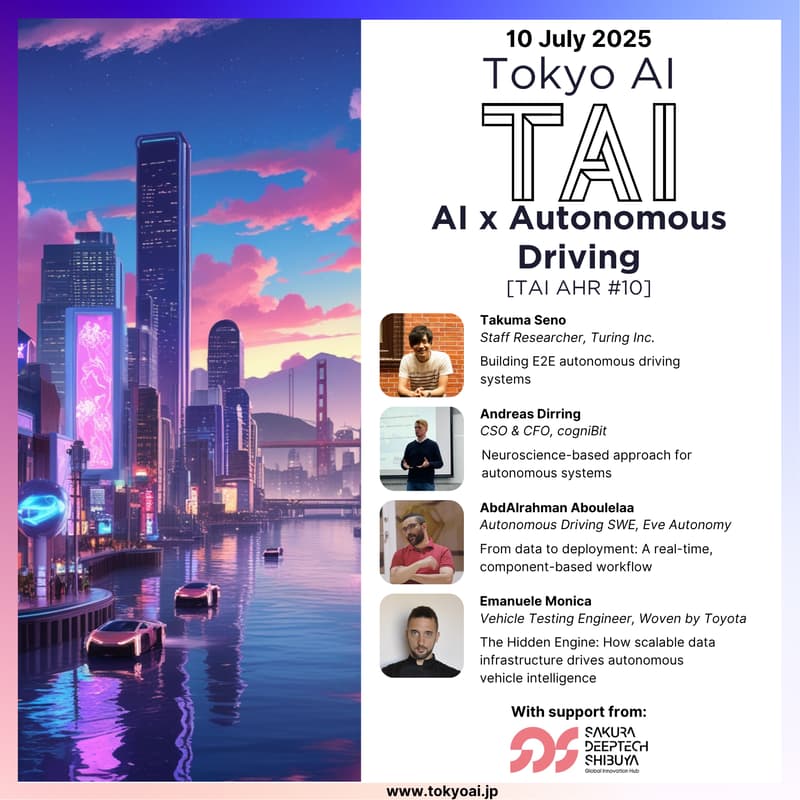

TAI AHR #10 - AI x Autonomous Driving
Agenda
AI × Autonomous Vehicles: From Data to Deployment
As autonomous vehicles advance toward real-world deployment, the synergy between AI and large-scale data ecosystems becomes ever more critical. This event brings together experts and practitioners working at the cutting edge of autonomous driving technology to discuss the entire pipeline—from intelligent data collection to high-definition mapping, ground truth generation, and Hardware-in-the-Loop (HIL) validation. The session will also explore the infrastructure challenges of handling and processing massive datasets essential for training and validating robust autonomous systems. Join us as we dive into the tools, methods, and infrastructure powering the next generation of autonomous mobility.
Speakers:
Talk 1 - Building E2E autonomous driving systems
Speaker: Takuma Seno (Staff Researcher, Turing Inc)
Abstract: At Turing Inc., we have been collecting autonomous driving datasets in the Tokyo area towards Tokyo30, our milestone where we are aiming to achieve autonomous driving for 30 minutes without any human interventions by the end of this year. In this talk, I'll share insights to drive this project as well as ongoing machine learning research in our team.
Bio: Takuma Seno is a Staff Researcher at Turing Inc., a Japanese startup focusing on E2E autonomous driving. He received a Ph.D from Keio University. He has been conducting deep reinforcement learning in fundamental and practical areas, including the Gran Turismo Sophy project at his previous position in Sony AI. In his current position, he is aiming to achieve an E2E autonomous driving system with deep reinforcement learning and foundation models.
Talk 2 - Neuroscience-based approach for autonomous systems
Speaker: Andreas Dirring (CSO & CFO, cogniBit)
Abstract: Traditional autonomous vehicle development struggles with edge cases in real-world traffic scenarios. This talk introduces cogniBIT's neuroscience-based "cognitive AI" technology that models the complete human sensorimotor chain to predict human behavior with unprecedented realism. Unlike conventional approaches facing the "long tail problem," cognitive AI combines machine learning with neuroscience insights to simulate authentic human decision-making, including human limitations like attention deficits. I'll share how this approach achieved competitive performance in the Waymo Challenge and is being deployed across automotive partnerships to accelerate human-aware autonomous systems.
Bio: Strategic and entrepreneurial executive with 20+ years of experience in finance, business development, and cross-border company building. Proven track record in founding, scaling, and restructuring companies in Europe and Asia, with a deep focus on the mobility, AI, and engineering sectors. Currently leading investor relations and strategic growth initiatives at cogniBIT GmbH, while building and managing venture operations in Asia. Combining financial expertise with innovation-driven leadership.
Talk 3 - From data to deployment: A real-time, component-based workflow
Speaker: AbdAlrahman Aboulelaa (Autonomous Driving SWE, Eve Autonomy)
Abstract: Autonomous vehicle development faces significant engineering and production workflow challenges that every practitioner encounters daily. This talk presents a unified, component-based approach to the entire AD lifecycle through an integrated platform ecosystem encompassing operating systems, simulation, visualization, and deployment tools. Rather than focusing on isolated AI models or theoretical visions, I'll demonstrate how real-time, integrated workflows address practical bottlenecks from data collection through testing, evaluation, HIL validation, and mapping. The presentation will showcase how this unified platform approach streamlines the complex engineering processes that bridge the gap between research and production-ready autonomous driving systems.
Bio: AbdAlrahman Aboulelaa is an Autonomous Driving Software Engineer at Eve Autonomy, with over 10 years of experience developing autonomous driving systems and robotics solutions. He led the platform development for autonomous driving projects, managing teams while focusing on simulation systems, HIL testing integration, and hardware sensor integration. His expertise spans from developing FMEA models for Level 4 vehicles to creating efficient CI/CD pipelines and automation tools for autonomous driving deployment.
Talk 4 - The Hidden Engine: How Scalable Data Infrastructure Drives Autonomous Vehicle Intelligence
Speaker: Emanuele Monica (Vehicle Testing Engineer, Woven by Toyota)
Abstract: Behind every breakthrough in autonomous driving lies an invisible but massive engine: data infrastructure. As fleets of autonomous vehicles generate petabytes of multimodal sensor data daily, traditional data pipelines fall short. Building safe, performant, and continuously improving AV systems requires a purpose-built, large-scale data infrastructure—capable of ingesting, storing, indexing, and learning from real-world and simulated environments at scale.
As AVs grow from testbeds to full-scale fleets, the quality and scalability of their infrastructure determines their ability to adapt, learn, and operate safely in the real world. This session will unpack why infrastructure is not just support—it is strategy in the race toward autonomy, and will explore how some of the most successful companies differ in their approach towards the subject..
Bio: Emanuele Monica is a seasoned engineer and technical leader with over 9 years of experience in the development of ADAS and AD technologies in Japan. With a career spanning multiple roles, he has specialized in designing and leading the development of large-scale data infrastructure to support the deployment of features in mass-production vehicles, designing innovative solutions around the topics of edge data acquisition, data upload, ground truthing, multi-region data management and resimulation. He now works at Woven by Toyota, currently on real vehicle testing
Tokyo AI (TAI) information
TAI is the biggest AI community in Japan, with 2,400+ members mainly based in Tokyo (engineers, researchers, investors, product managers, and corporate innovation managers).
Web: https://www.tokyoai.jp/